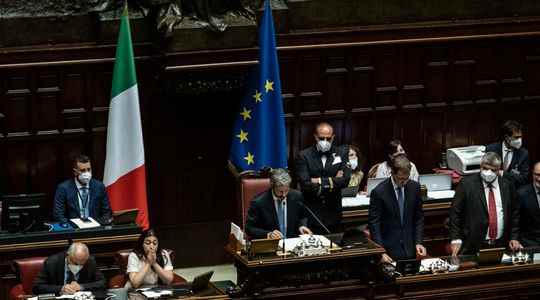“An absurd, ridiculous crisis, orchestrated by charlots”: the Italians do not have words severe enough to describe the parliamentary fight which led to the departure of the President of the Council, Mario Draghi. Deprived of its two supporting walls, the 5 Star movement and the centre-right, the government of national unity collapsed at a critical moment.
With a public debt of around 3 billion euros, Italy has undertaken to carry out liberal reforms to benefit from the 200 billion euros of the European recovery plan. “Our country cannot afford to take a break from essential interventions to deal with economic difficulties”, recalled the President of the Republic, Sergio Mattarella. You have to go fast. So quickly that the Jewish community accepted that the elections coincide with Rosh Hashanah, while in Italy you never vote during religious holidays.
Settling scores
In two months, the parties will therefore have to improvise electoral lists in a Parliament which will undergo a slimming cure, following the constitutional reform of 2020. And come to terms with the 70% of Italians who did not want elections anticipated. To prevent Draghi’s resignation, civil society mobilized like never before. Unions, entrepreneurs, local elected officials and citizens had called for the head of government to remain in place. The ace. On the ruins of the government, the political class is now settling its accounts, each returning to the other the responsibility for the crisis. Among the 5 Stars and in Berlusconi’s party, heavyweights are leaving their training. In the League, others remain, but challenge the leader. “In the debate in the Senate, the dignity of Parliament and of politics have been offended,” judge the influential Giancarlo Giorgetti, who represents the traditional electoral base of the Northern League.
The voters attend, disgusted, what they consider as bad palace games at the expense of the interest of the country. “The actors of democratic representation are no longer credible because they are no longer able to hold a position. They fight and are slaves to their very short-term strategies. This is experienced by citizens as a decline in representation democracy. It is very dangerous because history shows us that in these cases, the shortcut consists in choosing a strong leader. It is the antechamber of fascism”, judge Luca Verzichelli, professor of political science at the University of Siena, for whom “Italian parliamentary democracy is seriously ill”.
Incompatible programs
In the polls preceding the departure of Mario Draghi, the right-wing coalition was the winner with more than 45% of the votes for the team bringing together Fratelli d’Italia (Giorgia Meloni, 22%), the League (Matteo Salvini, 14.6 %) and Forza Italia (Silvio Berlusconi, 8.6%). The only one to have remained in the opposition during the aborted legislature, the post-fascist Giorgia Meloni, great rival of Matteo Salvini, has good reason to see herself as the first woman at the head of a government in Italy.
As long as the coalition holds, observes the former minister and leader of the Astrid think tank, Franco Bassanini, “these parties are ready to go to the elections together, but with programs that are not consistent with each other. On international politics, Forza Italia is Europeanist and Atlanticist, Fratelli d’Italia is Atlanticist but Eurosceptic, while the League is divided between Europeanists and Eurosceptics, Atlanticists and pro-Russians.” Luca Verzichelli continues: “With a government led by Meloni and a Matteo Salvini who is once again becoming a critic of Europe, Italy would lose a lot of weight in Brussels.”
But between now and the next elections, on September 25, the experts are expecting surprises. “New coalitions will appear,” predicts political analyst Alessandra Ghisleri. “It’s an old lesson in politics, adds poll specialist Lorenzo Pregliasco. We know how election campaigns begin, but we never know how they end.”
